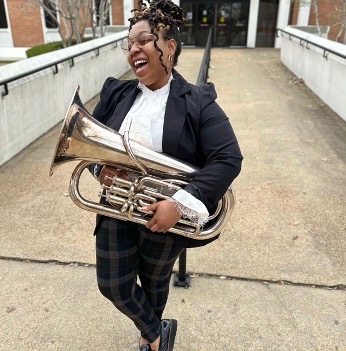
Chadijah Williams’ life story is inspirational. “Your situation is not your destination,” she exclaims. “You just gotta have enough faith and enough persistence to see it through.”
TRIO Student Support Services and CSTEP invited Chadijah Williams to motivate students at the Student Union with a Black Heritage Seminar presentation via Zoom on March 6.
Chadijah Williams is a talented musician who teaches music at Jackson State in Mississippi. She is also a motivational speaker, author, and educator.
She came to Old Westbury to tell her story. She spoke about her life growing up in the easternmost parts of Charlotte, North Carolina. At the age of nine she overheard an argument between her parents changed the trajectory of her life forever. Williams was ostracized by her father after hearing about his drug use. It was an act that altered her perception of acceptance and respect. Her home life affected her mental health, leading to both depression and suicidal ideation all before her teenage years.
Williams met her mentor, Ms. Hatchett, in the first grade. She was a lunch program monitor. She asked Ms. Hatchett lots of questions at lunch. Ms Hatchett’s answers provided a balanced perspective as she grew up.
Even as a small child, Williams did not hide her pride in Black History. She respects her mentor for encouraging this pride even though she was from a different ethnic background. Ms. Hatchett supported her all the way through college.
Williams is a first-generation college student who graduated in 2014 from Jackson State University, an HBCU in Jackson, Mississippi. While there, she did have some shortcomings at college with less-than-average academics and poor behavior. She found her tempo in the university marching band. She knew one day she would don the uniform of the “Sonic Boom of the South,” the historic band who recently performed at the Super Bowl LVII Halftime Show. “I saw this before I saw this,” she said, dreaming that she would one day do something never before done in her family. “My gift will make room for me,” she continued, “it will break generational curses.”
Williams worked at a popular pizza chain where she was racially profiled by her boss and falsely accused of stealing. This ultimately led to her arrest and imprisonment. She maintained her innocence and persevered. She knew she had a bigger purpose. Williams credited Ms. Hatchett for helping with her release, getting her record expunged and writing a letter to the corporation on her behalf. She says her life was never the same after that. Even though she only spent one day in jail, she knew that she had more to prove. Awaiting release she considered the plight of generations before her.
Williams told students that a lack of motivation is an obstacle on the path to graduation. “Don’t forsake the journey, just because you despise the vehicle,” she said. She used this metaphor in reference to academics. Homework, tests and quizzes are all steps in the pathway to one’s purpose. She said, “The weapon may be formed, but it will not prosper.” She believes her pain propelled her purpose.
After Jackson State, Chadijah Williams went to graduate school at Penn State on full-ride. She was the sole Black woman in her music program where she played instruments like the tuba, saxophone, and trombone.
“You have to finish to see it through,” she said. Today, Williams teaches music at her alma mater. She credits her gifts and perseverance. She encourages others to use their gifts to their fullest potential, through leadership, education, and the pursuit of knowledge. Williams believes that the youth have more power than they give themselves credit for. Students should recognize and nurture their gifts even if it’s just making someone laugh.
Williams’ testimony was engaging from beginning to end. It left me to ponder my own legacy. Knowing oneself, staying the course, and leaning into your strengths were her major themes. This message will remain relevant through this semester and as we navigate through academia and life itself.




